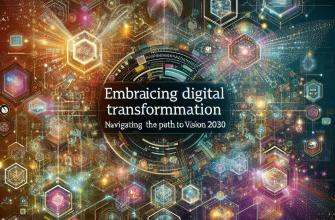Embracing the Future: Top Digital Transformation Trends Shaping Businesses in 2023
As we delve deeper into 2023, the digital landscape continues to evolve at a breakneck pace. For businesses aiming to stay competitive and relevant, understanding and adopting the latest digital transformation trends is not just beneficial—it’s imperative. As a digital marketing expert, I’ve observed several key trends that are set to redefine how businesses operate and engage with their customers. Here’s a closer look at the most impactful ones:
AI and Machine Learning Integration
Artificial Intelligence (AI) and Machine Learning (ML) are no longer just buzzwords but are at the core of digital transformation strategies. These technologies are enhancing customer experiences and streamlining operations. From personalized marketing campaigns to predictive analytics in inventory management, AI’s ability to analyze large datasets and automate complex processes is a game changer. In 2023, expect to see even more sophisticated AI applications, particularly in areas like customer service with AI-driven chatbots becoming more nuanced and context-aware.
Hyperautomation
Hyperautomation is an all-encompassing approach to automation that extends beyond traditional business processes. It involves the orchestrated use of multiple technologies such as Robotic Process Automation (RPA), AI, and ML to automate as many business processes as possible, enhancing efficiency and reducing operational costs. In 2023, hyperautomation is moving from an optional strategy to a fundamental business strategy that drives significant improvements in scalability, agility, and decision-making processes.
Enhanced Data Security Protocols
As digital transformation accelerates, so does the risk of cyber threats. In 2023, businesses are prioritizing the implementation of enhanced data security protocols to protect sensitive information. This includes the adoption of advanced cybersecurity technologies, regular security audits, and the training of employees on data protection best practices. The focus is on creating a secure digital ecosystem that can withstand the increasing sophistication of cyber attacks.
5G Deployment and IoT Expansion
The rollout of 5G technology is a major catalyst for digital transformation. Its high-speed and low-latency characteristics enable the massive expansion of the Internet of Things (IoT), where devices are interconnected and communicate seamlessly. This connectivity is revolutionizing industries by enabling real-time data transfer, enhancing operational efficiency, and opening new avenues for innovation in products and services.
Sustainable Digital Practices
Sustainability is becoming a cornerstone of digital strategies. Companies are increasingly leveraging digital tools to reduce their carbon footprint, optimize resource use, and promote sustainability in their operations. This includes everything from virtualizing office environments and data storage solutions to adopting energy-efficient practices in IT infrastructures.
Personalization at Scale
With advancements in data analytics and AI, businesses are now able to offer personalization at an unprecedented scale. In 2023, we’re seeing companies harness these technologies to deliver customized experiences that meet the unique needs and preferences of each customer, thereby enhancing customer satisfaction and loyalty.
The digital transformation trends of 2023 are not just reshaping business operations; they are redefining the very essence of how businesses interact with their customers and manage their internal processes. For companies willing to embrace these changes, the opportunities for growth and innovation are boundless. As we continue through the year, staying ahead of these trends will be crucial for any business aiming to thrive in the digital age.

A seasoned digital marketing strategist with over 8 years of experience across various areas of digital marketing, including SEO, SMM, PPC, content marketing, and email marketing. Specializes in transforming B2B, B2C, e-commerce, and SaaS businesses by creating effective go-to-market strategies and building thriving digital ecosystems. Known for a data-driven approach to optimizing campaigns and maximizing results.
“If your business is looking to scale or in need of a fresh perspective, feel free to contact”.





